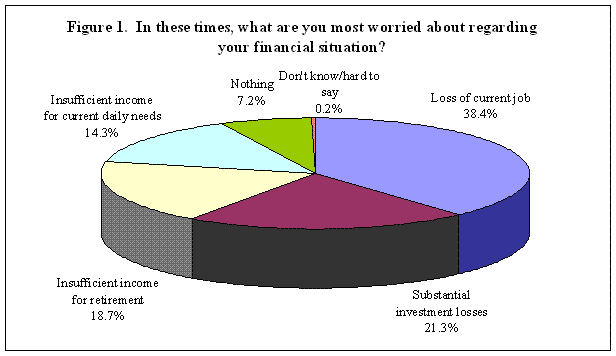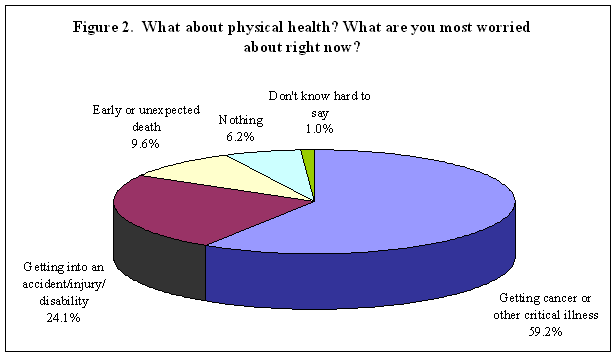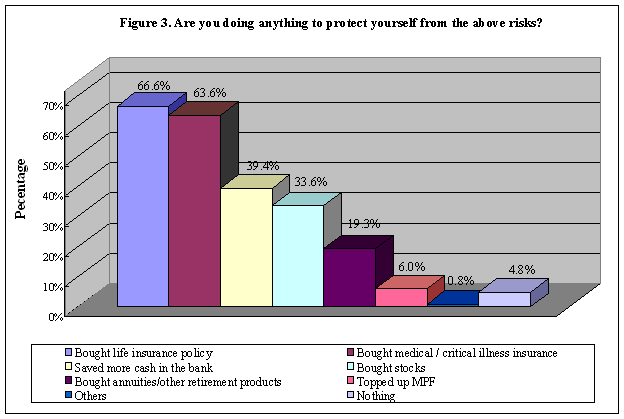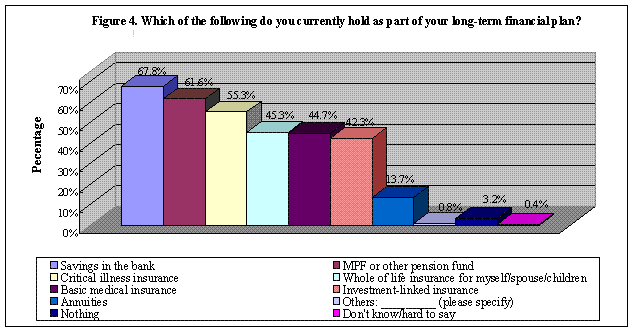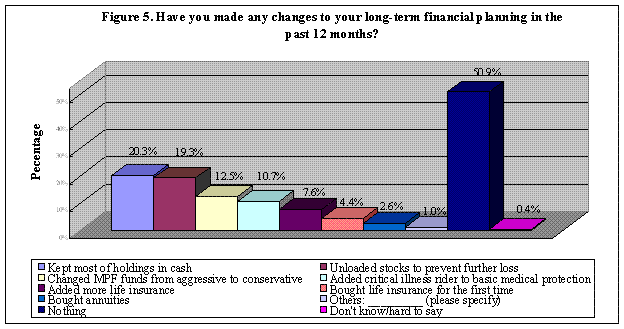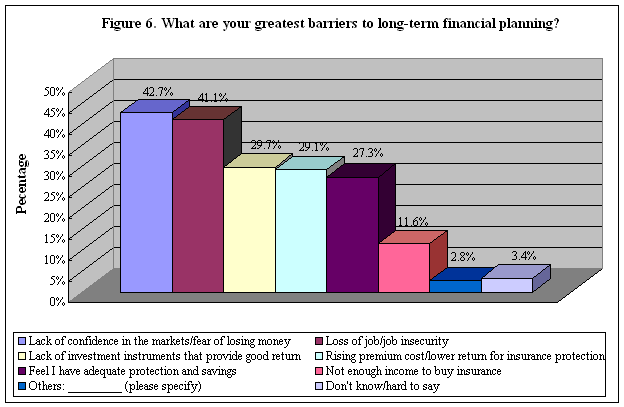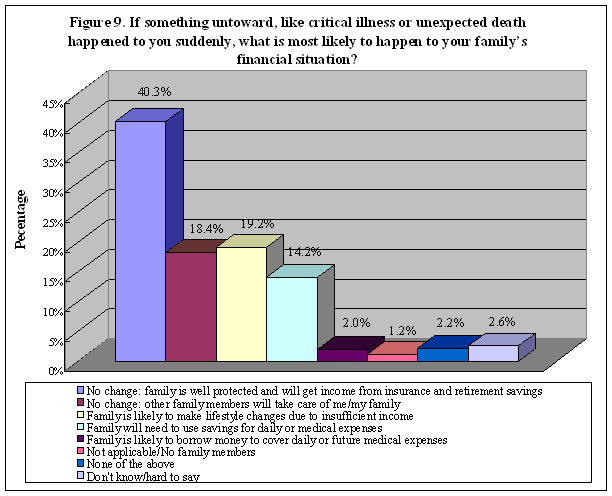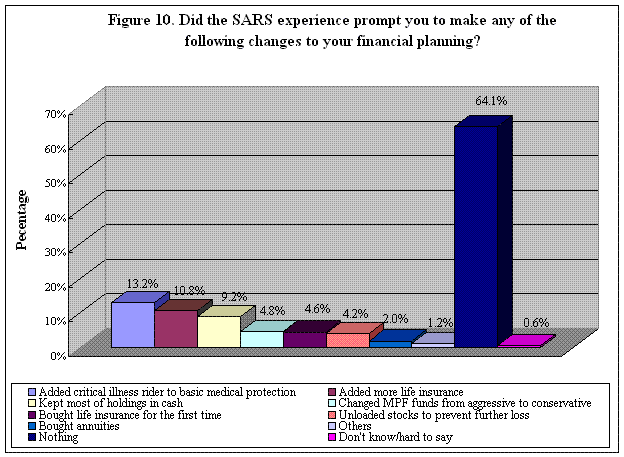Research Findings返回
This questionnaire survey comprised a total of 10 opinion questions and ended by mapping some basic demographics of the respondents. The key findings of these questions are summarized below. Cross-references could be made with the frequency tables in Appendix II. Concerns over financial situation, physical health and corresponding protection The survey started by asking all respondents what they worried most regarding their financial situation. Result revealed that 「loss of current job」 (38%) topped the list while about a fifth of them expressed concern over 「substantial investment losses」 (21%) and 「insufficient income for retirement」 (19%). Another 14% were most worried about 「insufficient income for current daily needs」 and 7% said they had 「nothing」 to worry financially (Table 3). See Figure 1..
Regarding their physical health, nearly 60% (59%) of the respondents were most worried about 「getting cancer or other critical illness」, followed at a distance by 「getting into an accident/injury/disability」 (24%). Relatively fewer respondents regarded 「early or unexpected death」 (10%) as their most concerned health problem whilst 6% claimed 「nothing」 (Table 4). See Figure 2.
In view of the above concerns, only a very small amount of people went totally un-protected and did 「nothing」 (5%). To protect themselves from the potential risks, more than three-fifths of them have 「bought life insurance policy」 (67%) and 「medical critical/critical illness insurance」 (64%) prior to the interview. 「Saving more cash in the bank」 and 「buying stock」 were the next two common measures as cited respectively by 39% and 34% of the total sample. Other current actions taken included 「buying annuities/other retirement policies」 (19%) and 「topping up MPF」 (6%, Table 5). See Figure 3.
Long-term financial plan and related issues When it comes to respondents' long-term financial plan, the three most popular components were, in descending order, 「bank savings」, 「MPF or other pension fund」 and 「critical illness insurance」 which accounted for a respective of 68%, 62% and 55%. At the same time, 45% each mentioned 「life insurance for themselves/their spouse/children」 and 「basic medical insurance」 while 42% had 「investment-linked insurance」. Only 14% held 「annuities」 as part of their long-term financial plan (Table 6). See Figure 4.
The survey continued by asking all respondents if they had made any changes to their long-term financial plan in the past 12 months. Results showed that the majority did not (51%). Meanwhile, about one-fifth 「kept most of holdings in cash」 (20%) and 「unloaded stocks to prevent further losses」 (19%) in the year past, whilst over one-tenth had 「changed MPF funds from aggressive to conservative」 (13%) and 「added critical illness rider to basic medical protection (11%). Only a minority had 「added more life insurance」, 「bought life insurance for the first time」 and 「bought annuities」 with a corresponding percentage of 8%, 4% and 3% (Table 7). See Figure 5.
In formulating their long-term financial plan, the top 2 barriers facing the respondents were their 「lack of confidence in the market/fear of losing money」 (43%) and 「loss of job/job security」 (41%), both taking up over 40%. 「Lack of investment instruments that provide good return」 (30%), 「rising premium cost/lower return for insurance protection」 (29%) and 「having inadequate protection and savings」 (27%) formed the next tier. In the meantime, 12% said they simply 「did not have enough income to buy insurance」 (Table 8). See Figure 6.
Results also revealed that the top 4 financial goals as cited by the respondents were, in descending order, 「steady and regular post-retirement income」 (59%), 「adequate medical protection in old age」 (56%), 「long-term protection for family」 (54%) and 「saving more cash in bank」 (51%). All these 4 options were mentioned by more than 50% of the total sample. On the other hand, 44% of the respondents keenly looked for 「adequate medical protection for critical illness」 while 26% said their primary goal at this moment was to 「recover from the investment losses」 (Table 9). See Figure 7.
Other questions If respondents had a sudden windfall or won the lottery, how would they spend the money? Results showed that 41% would 「buy property」, 33% would 「save/invest for retirement」 and 11% would 「pay off debts/mortgage」. A small proportion of respondents would 「donate to charity」, 「take a holiday/trip」 or 「buy insurance」 which accounted for 7%, 4% and 1% respectively (Table 10). See figure 8.
Another hypothetic question followed in order to gauge what would possibly happen to the financial situation of the respondents' family if something untoward, like critical illness or unexpected death, happened to them. Over half of the sample said their family would have 「no change」, in which 40% believed 「their family was well protected and would get income from insurance and retirement savings」 while the remaining 18% claimed 「other family members would take care of them/their family」. On the other hand, over 30% would foresee some changes to occur, in which 19% and 14% believed 「their family lifestyle was likely to change due to insufficient income」 and 「their family will need to use savings for daily or medical expenses」. Only 2% expressed a potential need to 「borrow money for daily or future medical expenses」 (Table 11). See Figure 9.
The survey ended by asking the respondents if they had made any changes to their financial planning due to the SARS happened in 2003. Results showed that as high as 64% said 「nothing」. For those who had, the 3 most common actions taken by the respondents were 「adding critical illness rider to basic medical protection」 (13%), 「adding more life insurance」 (11%) and 「keeping most of holdings in cash」 (9%). In the meantime, 5% each 「changed their MPF funds to conservatives」 and 「bought life insurance for the first time」 while 4% 「unloaded stocks」 back then. Even less respondents claimed they had 「bought annuities」 because of the episode (2%, Table 12). See Figure 10.
|




